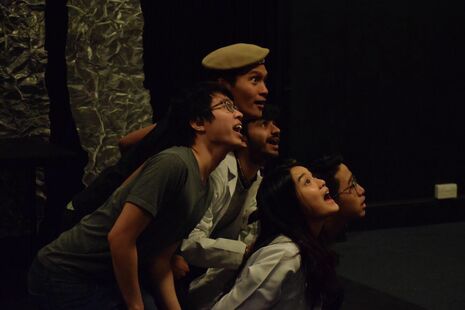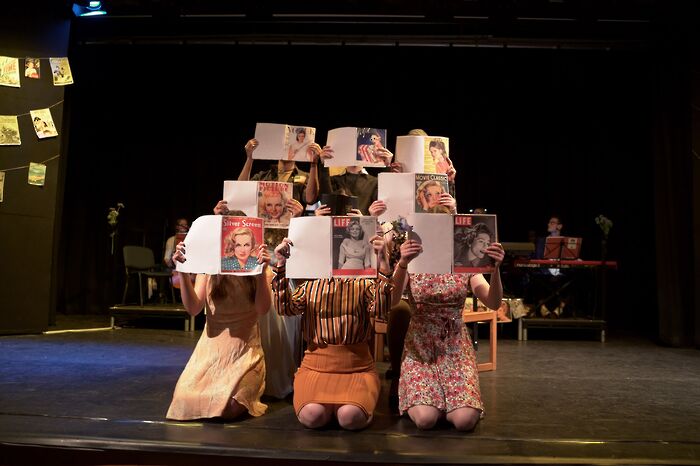Atomic Jaya preview
This Corpus Playroom production is both “a political satire” and “an incisively funny hyperbole of Malaysian identity”

The play starts with a solemn rendition of “Negaraku”, the Malaysian national anthem, and you get the feeling you’re in for a serious interrogation of national pride, jingoism and militarisation. But a closer look at the characters standing at attention reveals the idiosyncrasies that are set to unfold hilariously – General Zulkifli’s (Matthew Ryan) erect 45-degree salute hints at a Napoleon complex, the Cabinet Minister (Claire Chung) slouches in corrupt complacency, and our central character, the intelligent, ambivalent physicist Dr Mary Yuen (Iris Li), stares at the ground and fidgets with her lab coat. What ensues next is, if possible, more ludicrous than you’d expect.
"Atomic Jaya will herald an era of inclusivity and boldness"
Malaysian playwright Huzir Sulaiman’s Atomic Jaya is relentless from the beginning. It chronicles the escalating absurdity Yuen faces as she is recruited from a dead-end research job to develop Malaysia’s first nuclear bomb, surrounded by overbearing, overconfident and categorically incompetent men; along the way, it pokes fun at everything from the patriarchy to Malaysian politics, US foreign policy, racial stereotyping and colonialism. Its pithy dialogue is unexpected at every turn: weaving its way through topics like anti-Semitism, the arms race and the India-Pakistan divide with alarming alacrity, and leaving me winded from laughter.
Directors Shameera Lin and Jonathan Chan see the production as an important addition to the ADC canon. It is the first Malaysian play to be funded by and produced in a CUADC venue and follows last year’s production of the Singaporean play Boom. The choice to stage Atomic Jaya was a carefully made one since Shameera and Jon were conscious of the need to be simultaneously authentic to a local context and relatable to a Cambridge audience. Atomic Jaya satisfies both – the play is staged exactly according to the script; and while ridiculing distinctly Malaysian peculiarities, it is hardly sheepish in taking on universal anxieties stemming from race, gender and national identity. One cannot ignore the significant political and socio-cultural moment of awakening this production is staged amidst, both in Cambridge and internationally. The play spares neither coloniser nor its subject, from ridiculing the perpetuation of stereotypes of local racial groups from colonial times, to the unspoken deference in Asia to “white people”, to the hubris of Western superpowers in contemporary politics (at one point, US Secretary of State Madeleine Albright appears and quotes a “great American president” in her speech—“Ask not what your country can do for you; rather ask what our country can do to your country.”)
To audiences of Southeast Asian origin, some aspects of the production will hit closer to home. Linguistic acrobatics feature prominently – code-switching, linguistic mixing, dialects and colloquialisms uttered in the same breath accurately reflect the multicultural backdrop against which the narrative unfolds. Yet each character’s Manglish (Malaysian English) is unmistakably different, adopting the inflections of their respective ethnic backgrounds – Chinese, Indian and Malay. Racial stereotypes are inescapable and inform the central narrative of this play, of Yuen who, as a Chinese woman in STEM research, has to negotiate a spider’s web of prejudices. Shameera explains that a glossary will be provided to audience members; not as a translation manual, but for an “added layer of appreciation – kind of like a prac crit”, she adds laughing, referring to the critical essays that English students will be all too familiar with.
Shameera and Jon emphasise the importance of representation in the Cambridge theatre scene, and hope that this production will spur the growing momentum of representing a diversity of narratives, in theatre and beyond. They note how many in the cast and production team are not veterans of Cambridge theatre, but got involved because it was one they could finally identify with. It is hoped that Atomic Jaya will herald an era of inclusivity and boldness in the choice of productions that ventures outside of the “Anglo-American theatrical tradition” typically seen in Cambridge theatre, as described by Chan in an interview on CamFM.
Atomic Jaya is a political satire, a commentary on the postcolonial world order, an incisively funny hyperbole of Malaysian identity. Take from it what you will – whatever it is, it’s damn well worth a watch.
 News / Judge Business School advisor resigns over Epstein and Andrew links18 February 2026
News / Judge Business School advisor resigns over Epstein and Andrew links18 February 2026 News / Gov grants £36m to Cambridge supercomputer17 February 2026
News / Gov grants £36m to Cambridge supercomputer17 February 2026 News / CUCA members attend Reform rally in London20 February 2026
News / CUCA members attend Reform rally in London20 February 2026 News / Union speakers condemn ‘hateful’ Katie Hopkins speech14 February 2026
News / Union speakers condemn ‘hateful’ Katie Hopkins speech14 February 2026 News / Hundreds of Cambridge academics demand vote on fate of vet course20 February 2026
News / Hundreds of Cambridge academics demand vote on fate of vet course20 February 2026










